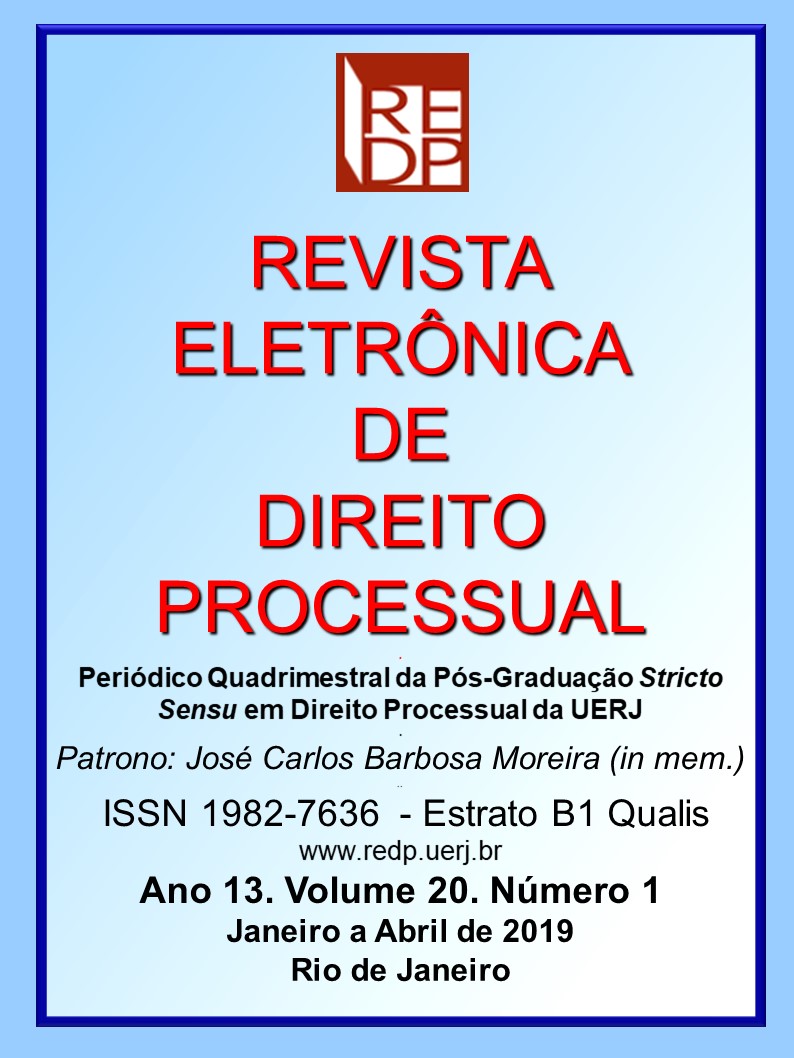ONCE AND FOR ALL: WHEN THE GOVERNMENT CONCILIATES CITIZENS’ CLAIMS
DOI:
https://doi.org/10.12957/redp.2019.42206Keywords:
Transidividual settlements, res judicataAbstract
Like the chorus in Shakespeare’s Henry the Fifth, those who proceed on behalf of society at large should have both the first and last word. They should possess the capacity to undertake this act of representation, whether in or out of court, with forcefulness and finality. Indeed, a genuine representative should not have to run the risk of others thereafter embarking upon the matter anew and standing in for whomever she is representing, as well as casting aside her effort as irrelevant, insufficient, or illegitimate. Therefore, a societal settlement, particularly when negotiated by the authorities, may have not only contractual but also procedural (or preclusive) implications, which (partly independently of intent) shield the contractors from litigation as well as liability. To that end, it may or may not, depending on the jurisdiction, require the judiciary’s endorsement in order to constitute the functional equivalent of a judgment. U.S. and civil-law principles of preclusion bar a subsequent suit insofar as it involves the same real party in interest (namely, the whole citizenry) and assertion (or cause and object) as its amicably averted antecedent counterpart. Judges and lawmakers in the United States, as well as Latin America, have invariably conceded these actions an erga omnes effect; in other words, against anyone with standing who might try to reignite the controversy. Settlers in these cases normally neither compromise on the underlying entitlements nor contract on the rights of someone else. In fact, they may and should vindicate these entitlements fully and facilitate the collective conciliation of claims based on collectivity’s own rights. The government, for its part, enjoys plenty of legitimacy to play this role and to settle on, as well as prosecute, these entitlements. In these disputes, the settling or suing actor steps into the shoes of the broader community. The latter, as the interested claimant, may not subsequently take another bite at the apple through a different spokesperson. Otherwise, it would unfairly and inefficiently burden, respectively, its opponents and the adjudicating tribunals in its quest for a windfall. Consequently, the trans-individual settlements and suits at stake should strengthen, rather than weaken, from a punctilious adherence to the requirements of res judicata. They should thereby further legitimate themselves and perhaps even solidify the political and social support from which they benefit.
Downloads
Published
How to Cite
Issue
Section
License
Todos os artigos publicados na Revista Eletrônica de Direito Processual (REDP) (Departamento de Direito Processual, Universidade do Estado do Rio de Janeiro, Brasil) são licenciados por meio de uma Licença Creative Commons - Atribuição 4.0 Internacional (CC BY 4.0).
Os autores retêm os direitos autorais de seu artigo e concordam em licenciar seu trabalho com a licença CC BY 4.0, aceitando assim os termos e condições específicos desta licença disponíveis no seguinte website: https://creativecommons.org/licenses/by/4.0/legalcode.
- Os autores concedem à REDP o direito de primeira publicação, de se identificar como publicadora original do trabalho e concedem à revista uma licença de direitos não exclusivos para utilizar o trabalho das seguintes formas: Reproduzir, vender e distribuir cópias eletrônicas ou impressas do manuscrito como um todo, de partes específicas do manuscrito e de suas traduções para qualquer idioma;
- O uso do artigo por terceiros é livre, contanto que a integridade da publicação seja mantida e seus autores originais, periódico de primeira publicação e detalhes de citação sejam identificados.
Dentro dos termos da licença, os autores podem entrar em acordos contratuais adicionais separados para a distribuição não exclusiva da versão publicada do trabalho na revista.
Copyright and Licensing
All articles published in the Procedural Law Electronic Review (REDP) (Department of Procedural Law, State University of Rio de Janeiro, Brazil) are licensed under a Creative Commons License - Attribution 4.0 International (CC BY 4.0).
- Authors retain copyright to their article and agree to license their work under the CC BY 4.0 license, thereby accepting the specific terms and conditions of this license available at the following website: https://creativecommons.org/licenses/by/4.0/ legal code.
- Authors grant REDP the right of first publication, to identify itself as the original publisher of the work, and grant the journal a non-exclusive license to use the work in the following ways: Reproduce, sell and distribute electronic or printed copies of the manuscript as a whole, of specific parts of the manuscript and its translations into any language;
- Use of the article by third parties is free, as long as the integrity of the publication is maintained and its original authors, first publication journal, and citation details are identified.
Within the terms of the license, authors may enter into separate additional contractual agreements for the non-exclusive distribution of the published version of the work in the journal.





